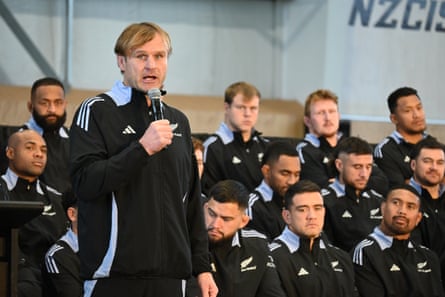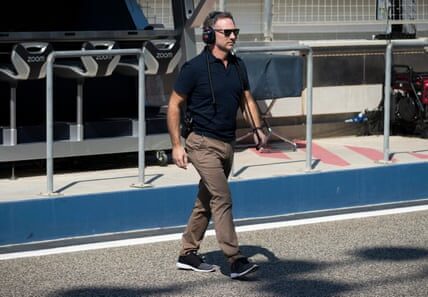The Breakdown | All Blacks’ alchemists are trying to turn mud-slinging into black gold
There are two types of game being played in international rugby union. The familiar one on the field and another – arguably even more significant – unfolding off it. Long gone are the days when the only big hitters were the players. With the greatest respect to every immovable Springbok prop and 100-cap All Black, they are not the people ultimately shaping their sport’s future.
To be in New Zealand is to be reminded of this development more forcibly than ever. There is still no bigger team in the global imagination than the All Blacks but the world is changing rapidly. Rugby’s century-old certainties are melting away faster than the polar ice-caps and reputation alone is scant insulation from the chill blast of post-Covid reality.
Because very few places in the sport feel entirely iceberg free. Certainly not Wales, supposedly one of the game’s spiritual heartlands and not England, where making the sums add up for all remains a major struggle. And not even in New Zealand, where last week’s annual results have revealed a net loss of NZ$8.9m (£4.25m) for the 2023 financial year at a time when NZ Rugby, their players’ association (NZRPA) and the provincial unions are at public loggerheads.
For the time being the NZRPA has not followed through on its dire warnings of an historic schism if a range of independent governance recommendations were not fully embraced. Either way, there can be no ducking last year’s savage review that found NZR was effectively “unfit for purpose” and needed to change “urgently” with their existing provincial NPC model seen as “unsustainable”. The All Blacks new head coach, Scott Robertson, is not alone in being under the spotlight.
It is either a good or bad time, then, to be sitting in the Auckland HQ of New Zealand Rugby, talking to the union’s chief executive Mark Robinson and his commercial guru Craig Fenton, the would-be alchemists trying to transform all this mud-slinging into bankable black gold. Robinson, an ex-All Black who played alongside Jonah Lomu and Christian Cullen, has already made his mark by negotiating a NZ$200m private equity deal with Silver Lake that, if nothing else, has cut New Zealand rugby some temporary post-Covid slack.
The personable Fenton, the new CEO of New Zealand Rugby’s commercial arm, is a more recent arrival but possesses a fascinating CV: a one-time barrister he has spent the past 25 years based in Europe and, until last year, was Google’s managing director of strategy and operations for the UK and Ireland. He has also launched his own record label to give talented artists from less privileged backgrounds a start in the industry and admits to being a Guardian reader, all of which separates him from the herd of traditional rugby administrators.
His interest in business and technology was sparked by his father who had a toy company that, at short notice, was forced to adapt to the world of electronic toys and games. On paper, at least, he has the necessary skill set to navigate New Zealand Rugby away from the jagged rocks of financial oblivion and onwards to a brighter horizon, whether that be via streaming channels, digital innovation or something yet more futuristic. “It’s the old Wayne Gretsky quote, isn’t it?’ he says. “You skate to where the puck is going to be, not where it is now.”
Because the bottom line, he stresses, is that professional rugby cannot simply cling to what worked a decade or two ago. Even a bit of political turbulence and controversy – “I’ll take that any day of the week over apathy” – is not necessarily a bad thing. “We live in an attention economy. And sport and rugby are competing with others for that attention.

“Rugby’s a game that’s more than a century old. The skills and athleticism on the field remain a core part of it. But the ways our fans experience us has fundamentally shifted in the digital era. There is definitely a lot of headroom to grow and meet the fan where they are.”
Whether that be blink-and-you-miss it short-form content, live footage, audio or long reads, it all adds up. “The fundamental driver from a commercial perspective is an engaged global fanbase. We need to give fans something to cheer for. Get that right and everything else follows. Broadcasters pay more, sponsors pay more and you sell more match tickets and merchandise.”
Hence why World Rugby is so keen to launch its biennial Nations Cup tournament in 2026. In recent weeks, though, the Breakdown has spoken to a number of stakeholders still to be convinced the proposed concluding finals series in Qatar will be the promised salvation if, among other hurdles, away fans cannot travel. New Zealand, perhaps tellingly, have just agreed to resume old-school multi-Test tours against South Africa, to widespread enthusiasm. “The Nations Cup has got some things we need to continue to work through,” says Robinson, set to play host to his RFU counterpart, Bill Sweeney, this week.
after newsletter promotion
The pair will definitely have plenty to chat about – “they’re a bigger beast than us but, at the same time, they’ve got a lot of mouths to feed,” says Robinson – not least the thorny subject of Test players signing lucrative club deals and relocating abroad.
“There are clearly different markets at the moment. England has got decisions to make in terms of eligibility. It’s not for me to comment but everyone’s considering different challenges and opportunities at the moment.”
Quite so. But the inescapable truth, as Fenton reiterates, is that the global game needs to pull together as never before. “Unlike music it’s not a solo act. The strength of the whole drives the strength of each of us and they’re inseparable.”
Keep fighting yesterday’s battles and the entire sport will find itself staring down the barrel.
-
This is an extract taken from our weekly rugby union email, the Breakdown. To sign up, just visit this page and follow the instructions.
Source: theguardian.com


